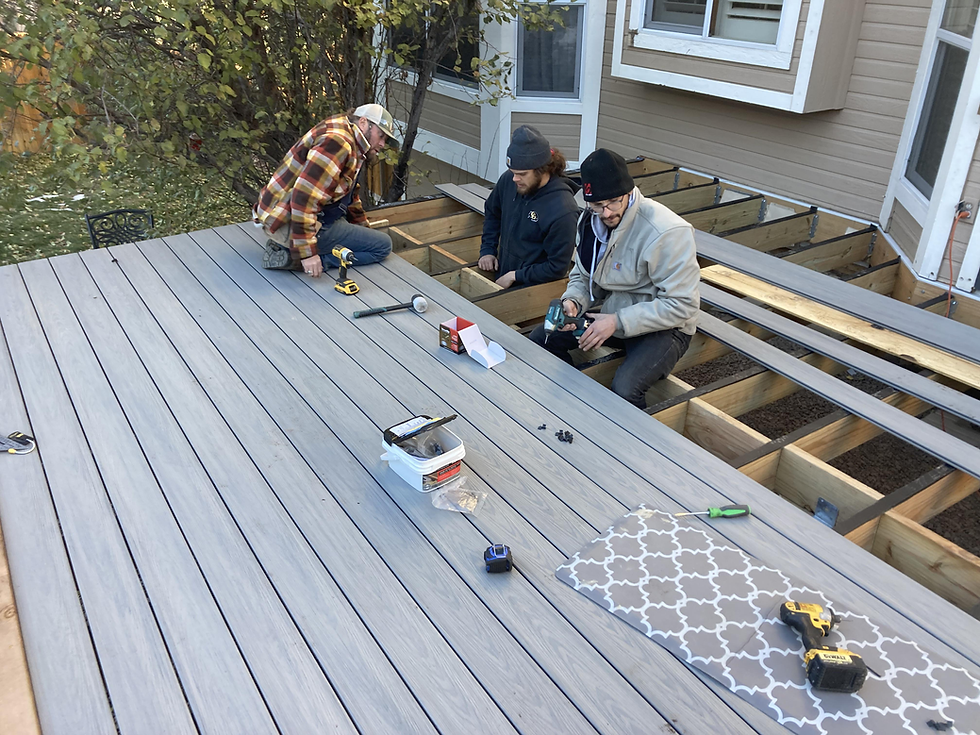Composite Decking vs WPC Decking: Which One Should You Choose?
- Nabihah
- Jul 14, 2025
- 3 min read
Table of Contents
Introduction
Choosing between composite and WPC decking? Here’s what you need to know right away.
Both composite and WPC decking are modern alternatives to traditional wood, offering low-maintenance and long-lasting outdoor flooring options. But they’re not the same thing. Understanding their differences can help you make a smarter decision for your home.
What is Composite Decking?
Composite decking blends wood fibers and plastic for strength and longevity.
Composite decking is typically made from a mix of recycled wood fibers and high-density polyethylene (HDPE). It’s known for being resistant to rot, mold, and insects, making it a durable choice for outdoor use. Brands like Trex and TimberTech popularized this category.

What is WPC Decking?
WPC stands for Wood Plastic Composite – similar but not identical to composite decking.
WPC decking uses wood powder and thermoplastics but may include more fillers and less refined materials. While it's also low maintenance and eco-friendly, quality can vary widely depending on the manufacturer.
Durability and Maintenance Comparison
Which decking lasts longer with less upkeep?
Composite decking: High resistance to moisture, fading, and warping.
WPC decking: Durable but may be more prone to swelling or cracking in harsh weather.
Both options require occasional cleaning but no sanding, staining, or sealing.
Cost Differences
Is one option more budget-friendly?
WPC decking is generally cheaper upfront, making it a popular choice for budget-conscious homeowners.
Composite decking may have a higher initial cost but offers longer-term value due to its superior durability.
Aesthetic Appeal & Design Options
Which decking looks better?
Composite decking often offers more realistic wood grain textures and a wider range of colors.
WPC decking can look slightly more artificial depending on quality.
Some premium WPC boards now rival composites in appearance.

Environmental Impact
Are both options eco-friendly?
Both use recycled materials, reducing the need for virgin wood.
Composite boards usually last longer, reducing waste over time.
Look for certifications like FSC or Green Label when making your choice.
Did You Know?
Composite decking can last up to 25–30 years with minimal care.
WPC was originally developed for marine applications due to its water resistance.
Some brands offer capped composite boards with an extra layer for added protection.
Conclusion
If you're looking for a more premium, long-lasting solution, composite decking is likely the better investment. However, if budget constraints are a major factor, WPC decking offers a solid, eco-friendly alternative.
Before making a decision, always compare warranties, brand reputation, and sample boards. This ensures you get the best value for your outdoor living space.

FAQs
1. Is WPC decking the same as composite decking?
Not exactly. While similar, composite decking often uses higher-quality materials and manufacturing processes than standard WPC.
2. Which lasts longer: composite or WPC decking?
Composite decking generally lasts longer, with lifespans of up to 30 years.
3. Can both types of decking handle heavy rain and sunlight?
Yes, but composite decking tends to be more stable under extreme weather conditions.
4. Is it safe to install these deckings around pools?
Both are water-resistant and suitable for poolside use, but always check the slip-resistance rating.
5. How do I clean composite or WPC decking?
Use mild soap, water, and a soft brush. Avoid high-pressure washers unless specified by the manufacturer.
Looking to upgrade your outdoor space? 🌿
Choose the right decking material today! Contact us via WhatsApp for free samples and consultation 👉 https://www.decking.my/









Comments